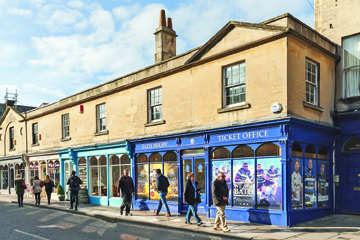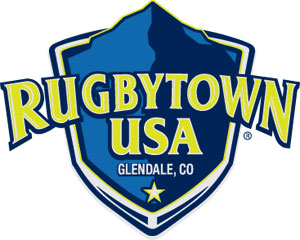by John Arthur
Writer for and on behalf of the City of Glendale
Legend has it that the game of rugby began in the United Kingdom nearly two centuries ago. Rugby has grown immensely in scope and popularity ever since. Consistently one of the most played and watched sports internationally, rugby has a substantial foothold in the United States as well, one that promises only to increase with the launch of the nation’s forthcoming professional league, Major League Rugby (MLR). Glendale, Colorado, has long been the focal point of rugby in America — home to highly skilled, championship-winning teams, site of the first rugby-specific stadium in the country, and now home to a founding member team in the new professional league: The Glendale Raptors.

Surrounding the Bath Rugby grounds, the City of Bath in the United Kingdom offers another layer of inspiration for the Glendale Raptors coaches.
Part of what makes Glendale’s Infinity Park such a special place for rugby is the organization’s commitment to retaining exceptional coaching staff. Sourced both nationally and from abroad, Glendale’s coaches are some of the best in the business. In December 2017, Glendale’s Director of Rugby Mark Bullock, and David Williams, head coach for the professional Raptors team, traveled to England to observe some of that country’s top teams and coaches. Knowing the level of support and professionalism rugby enjoys in England, Bullock and Williams endeavored to continue Glendale’s commitment to excellence in the sport by exploring the rugby environment in the U.K. — an effort they believe will improve the Raptors’ chances at success on the American professional rugby stage.
The purpose of the trip to England was multifaceted, with both Bullock and Williams fully immersing themselves in the European rugby scene, observing and interacting with established professional organizations. The Glendale duo took in Champions Cup matches, and visited with coaching and support staff from the London Irish, London Harlequins, and Bath Rugby teams. Coach Williams also met staff from the London-based Saracens Football Club, Bristol Rugby, and national strength and conditioning coaches. In addition to their work on increasing rugby knowledge in preparation for the upcoming MLR seaso

The Bath Rugby ticket office shows how well integrated the club is within the cultural fabric of this United Kingdom city.
n, Williams and Bullock were scouting hospitality at stadium venues, ticket sales, and sponsorship opportunities that could be implemented in Glendale. The Raptors are committed to continuing to create a fun, engaging, meaningful fan experience throughout the forthcoming professional season and beyond.
With the enormous success of Glendale’s Academy program last year, the trip also served as an exploration of how teams in the U.K. handle developmental organization and outreach to their local rugby communities. The Glendale Raptors Rugby Academy is an elite men’s development team for players under the age of 23 (U23). Designed as a feeder team for the professional MLR Raptors, the U23 squad enjoyed great success in 2017, with several players signed to play professionally. Although England’s academy programming presents boundaries of pay and other regulations controlled by the Rugby Football Union, Bullock reported that a number of usable techniques came from discussions with the English teams, knowledge he expects will benefit the Raptors programming. Additionally, Bullock noted an exciting potential exchange program between Glendale and Bath academy players, one that would allow Glendale’s players to improve their skills in the professional English Premiership environment, and provide the Bath squad with increased match opportunities in the U.S.
As part of their trip, and to experience as much of England’s professional rugby expertise as possible, Bullock and Williams attended practice sessions, coaches’ meetings, and sat in on Bath Rugby’s team building exercises. Bullock reported that the teams were quite welcoming: “Bath went out of their way to accommodate us and share their best practices. We were able to discuss their organization and their future plans with Director of Rugby Todd Blackadder and CEO Tarquin McDonald, and spent time talking about team culture and what it takes to be successful.” David Williams also noted that the English clubs, coaches, and players were both informed and curious about the professional league launching in the United States: “All the Premiership clubs were aware of MLR and of Glendale, and were welcoming and inquisitive about our Raptors team and the new professional league. That’s great to hear from these diehard rugby professionals, as eyes and ears are watching and listening worldwide.”
Given the sport’s long history in the United Kingdom, it should come as no surprise that both Bullock and Williams agreed that the fan engagement and response there, as compared to the United States, is considerably more robust — for now. Bullock described enjoying a pint with a few local Bath fans, longtime season ticket holders who were all in the team colors and talking up their squad’s chances to compete at a high level in 2018. Games were sold out, VIP boxes full, and an excited, electric atmosphere surrounded the grounds.
Williams summed up the trip, and the Raptors’ bright future in professional rugby, nicely: “Rugby is a major sport in the U.K. and has been for many years. We have a long way to go to gain the same footprint, but with the national CBS television coverage allowing rugby viewership across the country, and our loyal and growing Raptors fan base encouraging new fans to come to the stadium, we will show the United States the spectacle of the sport of rugby.”
As the first games of the Raptors inaugural professional season draw near, it is clear that the team’s leadership is fully prepared to continue its storied evolution, and to meaningfully engage an American audience.

